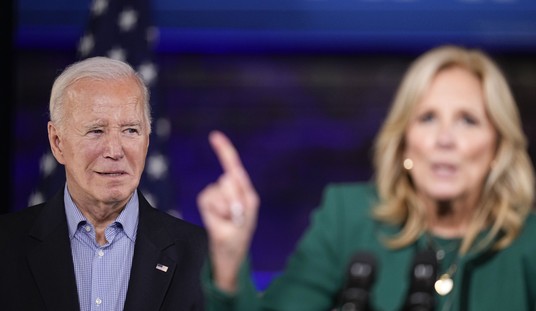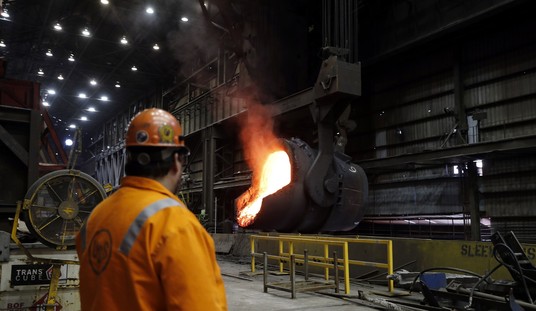[youtube WH_MBwQhGgA]
At the Daily Caller, Prateik Dalmia explores “Why Hollywood Loves Democrats.” The reasons he lays out may be old news for some, but it’s still worth a read. Here’s a sample:
I believe that’s because Hollywood has a deep distrust of free markets. That’s why, as George Mason University economist Alex Tabarrok pointed out in the Wall Street Journal this June, Hollywood frequently portrays capitalists as villains in films: Erin Brockovich, Syriana, Mission Impossible II, Star Wars (yes, it’s true, Jaba the Hut is a literal business worm meant to represent commerce), The China Syndrome, Wall Street, the list continues.
But why is Hollywood so anti-free market? The clue lies in Harvard political philosopher Robert Nozick’s brilliant 1986 essay in which he examines a similar antipathy toward capitalism on the part of intellectuals (academics, novelists, literary critics, etc.).
Briefly, Nozick explained that intellectuals go through school being told that they are the most valued members of society and being rewarded by a central authority (the teacher) for their superiority. But their expectations of maintaining such status after graduation rarely come to fruition.
“By and large, a capitalist society does not honor its intellectuals.” By contrast, many of their peers who might have been academically inferior to them end up doing much better than them financially. When intellectuals see the market heaping lavish rewards on people below them in intellectual stature they form the idea that the world is unfair. Betrayed and humiliated, they become suspicious of capitalism and favor a more just, centrally-planned redistribution.
In Hollywood, personal merit and societal reward are correlated in the reverse way.
There is no reason to believe that Hollywood actors and actresses were anything beyond average members of society growing up. Most actors and actresses were probably drama geeks, neither exceptionally popular nor academically honored. Owen Wilson, for example, was expelled from high school in 10th grade after he stole his math teacher’s textbook in an attempt to cheat on his homework.
However, at the blink of an eye, these mere mortals are catapulted into stardom. Their economic standing is elevated to absurd levels and the world watches their every step as if they are God’s greatest gift to humanity. While they do not change, society’s perception of them goes from indifference to deification.
They wonder why they are so fascinating that the paparazzi need to document their morning trip to the supermarket. As Jim Carrey (a Robin Hood leftist) once said, “If my career in show business hadn’t panned out I would probably be working today in Hamilton, Ontario, at the Dofasco steel mill.”
Hollywood stars hence feel that there is something arbitrary about their success — that their personal merit does not warrant their revered status. While they may be pleased at this outcome, they can’t help but feel that the system is unjust because their status is undeserved. They watch people in the lower rungs of society struggle and become overcome by a deep sense of guilt for holding the winning ticket in the lottery of life. They distrust capitalism for the seemingly unfair inequality it produces and thus favor redistribution.
In contrast to Websites, blogs, podcasting, and video destined for the Web, film and fictional TV are the two of the last mediums that require bringing together large groups of people and a fair amount of capital in a single location to produce. That’s going to change in coming years, for a few reasons. Advertising money has become more diluted, because of our current economic malaise, because it’s slowly exiting television for the Web, and because there are no so many more TV channels to spread it around, unlike the mid-century days of the Big Three networks. All of that impacts TV salaries and budgets. (There’s an interesting observation by Roger Simon and Lionel Chetwynd in their latest Poliwood that TV actors’ salaries, while still enormous compared to the average person’s, are down considerably from the past due to a reduced advertising influx, and somewhere — boy that narrows it down, huh? — I recall reading that Mad Men does not pay its ensemble cast all that well.)
Even to do videos involving virtual sets, such as my Silicon Graffiti videos, and the shows they’re doing at PJTV, require a fair amount of hardware, software, video lights, and time to pre-produce and edit these shows. Slowly though, the costs for entry are coming down, and the ease of use of the software and hardware will continue to improve. And the Web has opened up new vistas to distribute indie films.
Thus, even more workers will be able to get their hands on the levers of production, all courtesy of that same capitalism and free market (well, sorta-kinda these days) that deep-thinking Hollywood actors deeply distrust.
(Video H/T: 5’F)
Related: “Brad Pitt: Let’s Execute Some BP Executives.”
Update: Welcome Big Hollywood readers!










Join the conversation as a VIP Member